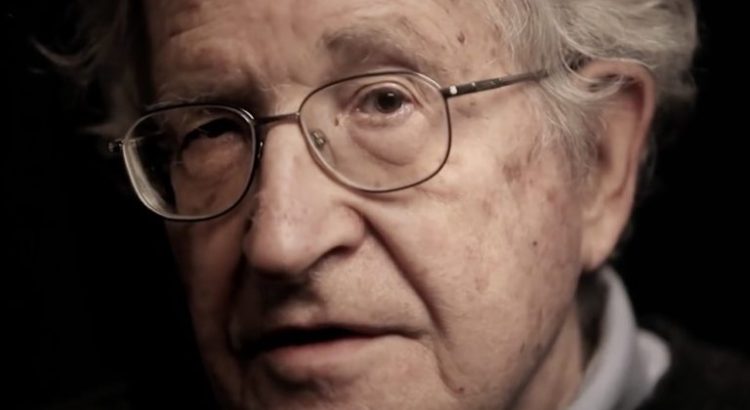North American/USA/OCtober 21, 2016/libertyblitzkrieg.com/Por: Michael Krieger
Resumen: Dice el autor de esta nota refiere el documental de Noam Chomsky, denominado: En Búsqueda del Sueño Americano, el cual proporciona una hoja de ruta histórica de cómo se producen los cambios y que dictamina la política en los Estados Unidos, además de evaluar la naturaleza de los problemas ambientales que ocasiona algunas practicas indiscriminadas producto del consumismo mundial, Noam lo denomina como una eminente colisión con el desastre. Es esta nota también se plantean elementos que tienen que ver con la exposición conveniente de los medios de comunicación a la divulgación y denuncia de algunos temas, como: la guerra, la hambruna, la educación y el financiamiento de armas bélicas.
Noticia original:
I recently watched the 2015 Noam Chomsky documentary, Requiem for the American Dream, and it was excellent. I highly recommend everyone watch it since it provides a historical roadmap for how positive change happens. Lessons that we will all need to put into practice in the coming years if we want to take the world off its current collision course with disaster.
With Chomsky already on my mind, I was excited to see an article published yesterday at AlterNet titled, Noam Chomsky Unravels the Political Mechanics Behind His Gradual Expulsion From Mainstream Media.
Here’s what we learned:
Ralph Nader and leading linguist Noam Chomsky engaged in a much anticipated discussion in early October on Ralph Nader Radio Hour. The two raised questions about changing the media narrative in a totalitatian-like state, and how Chomsky got dismissed from the mainstream altogether.
“How often have you been on the Op-Ed pages of the New York Times,” Nader asked Chomsky.
For Chomsky, the last time was over a decade ago.
“[I was asked] to write about the Israeli separation wall, actually an annexation wall that runs through the West Bank and breaking apart the Palestinian communities… condemned as illegal by the World Court,” Chomsky told Nader.
Chomsky would later pen a similar piece for CNN on the 2013 Israeli-Palestinian peace talks. But Chomsky has never been interviewed on the network; Nor has he appeared on NBC, ABC or CBS.
“How about NPR and PBS, partially taxpayer-supported.. more free-thinking and more tolerant [outlets]?” Nader wanted to know.
“I’ve been on ‘Charlie Rose’ two or three times,” Chomsky told Nader, adding that he had a curious story about a particularly Boston outlet for NPR based in Boston University.
“They used to have a program in their prime time news programs all things considered some years ago at 5:25… maybe once a week or so, a five-minute discussion with someone who had written a new book and there’s a lot of pressure,” Chomsky began.
NPR was going to allow Chomsky to present his book, “Necessary Illusions: Thought Control in Democratic Societies” (1989).
“I got a call from the publisher telling me when I should tune [in at 5pm] and I never listened [before], so I tuned in [and] there was five minutes of music… I started getting phone calls from around the country asking ‘What happened to the piece?’” Chomsky remembered.
He didn’t know.
“I then got a call from the station manager in Washington who told me that she’d been getting calls and she didn’t understand it because it was listed… she called back saying kind of embarrassed … that some bigwig in the system had heard the announcement at five o’clock and had ordered it cancelled,” Chomsky explained.
This is not what a free press looks like.
The irony of Chomsky’s media criticism being dismissed by the media is not lost on the former MIT professor, who remains constantly awed by America’s level of censorship.
“Any one of the former Bush-Cheney warmongers like Paul Wolfowitz and John Bolton and others have gotten far more press after they’ve left federal positions; in the New York Times The Wall Street Journal the Washington Post,” Nader said.
And unlike Chomsky, “They’ve been on television public television, NPR and they have a record of false statements; they have record of deception, they have record of pursuing policies are illegal under our Constitution under international law and under federal statutes such as criminal invasion of Iraq and other adventures around the world,” Nader pointed out.
But the media problem permeates thouroughly throughout other industries, like education and government.
“Now a society that operates in a way where propaganda is not only emanating from the major media but it gets into our schools, the kind of courses are taught, the content of the history, is a society that’s not going to be mobilized for its own survival, much less the survival of other countries whose dictators we have for decades supported to oppress their people,” explained Nader.
Below you can find Nader’s full interview of Chomsky as well as the trailer for the documentary, Requiem for the American Dream.







 Users Today : 1
Users Today : 1 Total Users : 35459907
Total Users : 35459907 Views Today : 1
Views Today : 1 Total views : 3418466
Total views : 3418466